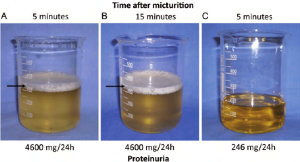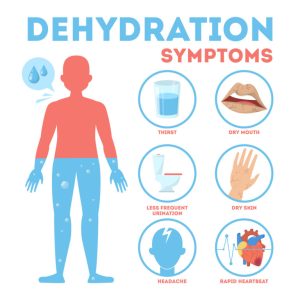One of the things that doctors expect us to do in the bathroom is to always take a look at the content of your visit before you flush. That way, you’ll notice if your urine foams or if there’s blood in your poop or urine.
This will enable you to see a doctor for evaluation and check any health problems that may be involved before it gets out of hand.

What normal urine looks like
According to a nephrologist who specializes in kidney disease, Dr. Jaye Olugbodi, normal urine is clear, with a yellowish hue, with no blood or foam. But foam is different from bubbles, she says.
“Bubbles are bigger, clear and flushable,” Dr. Olugbodi explains, noting that everyone will have bubbles in the toilet after urinating. Foam, on the other hand, is white, and it stays in the toilet after you flush.
“Foamy urine, also known as proteinuria, is a condition where the urine appears frothy and foamy when passed. Normally, urine contains a small amount of protein, but when the levels of protein become excessive, it can cause the urine to foam. This can be an indication of an underlying health issue that needs to be addressed,” a General Practitioner, Dr. Yemi Craig, explains.
Possible causes of foamy urine
Kidney problems: According to experts at Fresenius Kidney Care, when your kidneys are damaged, they can allow too much protein to pass through into your urine. This is called proteinuria.
As stated above, the high levels of protein in urine can cause it to be foamy. Protein in urine is not a problem itself, but it can be a sign that something is wrong.
Normally, urine contains a small amount of protein, but when the levels of protein become excessive, it can cause the urine to foam
“Conditions like chronic kidney disease or glomerulonephritis can lead to increased protein leakage into the urine, resulting in foamy appearance,” Olugbodi warns.
Urinary Tract Infections: Dr. Craig says a urinary tract infection (UTI) can cause foamy urine when bacteria is also in the bladder.
“In addition to foamy urine, other symptoms that may arise include pain or burning when urinating, frequent urination, and blood in the urine,” the physician says.
These infections can irritate the urinary system and lead to the presence of proteins in the urine, she adds.
 Dehydration: Experts say dehydration occurs when your body loses more fluid than you take in. When the normal water content of your body is reduced, it upsets the balance of minerals (salts and sugar) in your body, which affects the way it functions. Water makes up over two-thirds of the healthy human body.
Dehydration: Experts say dehydration occurs when your body loses more fluid than you take in. When the normal water content of your body is reduced, it upsets the balance of minerals (salts and sugar) in your body, which affects the way it functions. Water makes up over two-thirds of the healthy human body.
Family Doctor Tina Egbuche, says sometimes, urine can also foam up when it’s concentrated.
“Your urine is more concentrated if you haven’t had much water to drink and you’re dehydrated.
“Foamy urine can also indicate that you have too much of a protein, such as albumin, in your urine. The protein in your urine reacts with the air to create foam.
“When the body is dehydrated, the concentration of urine increases, and it can become foamy as a result. Ensuring adequate hydration can help resolve this issue,” Egbuche explains.
 Excessive physical activity: Experts at Mayo Clinic say strenuous exercise may cause so-called exercise-induced proteinuria. This type of protein presence in urine is associated with increased activity of the kidney endocrine regulating system. Another possible reason for foam in urine is kidney trauma.
Excessive physical activity: Experts at Mayo Clinic say strenuous exercise may cause so-called exercise-induced proteinuria. This type of protein presence in urine is associated with increased activity of the kidney endocrine regulating system. Another possible reason for foam in urine is kidney trauma.
The experts warn that intense physical activity or heavy exercise can cause temporary proteinuria due to stress on the kidneys. “Strenuous exercise can lead to the release of proteins into the urine, causing foamy appearance,” they say.
 Preeclampsia (in pregnant women): According to Oby-Gyn Dr. Funmi Odubela, preeclampsia symptoms include frothy urine, nausea or vomiting, fatigue, loss of appetite, swollen hands, feet, or ankles, and abdominal pain, which require urgent medical attention.
Preeclampsia (in pregnant women): According to Oby-Gyn Dr. Funmi Odubela, preeclampsia symptoms include frothy urine, nausea or vomiting, fatigue, loss of appetite, swollen hands, feet, or ankles, and abdominal pain, which require urgent medical attention.
She adds that preeclampsia is a serious blood pressure condition that develops during pregnancy.
“People with preeclampsia often have high blood pressure (hypertension) and high levels of protein in their urine (proteinuria). Preeclampsia typically develops after the 20th week of pregnancy and is a medical emergency,” Dr. Odubela says.


